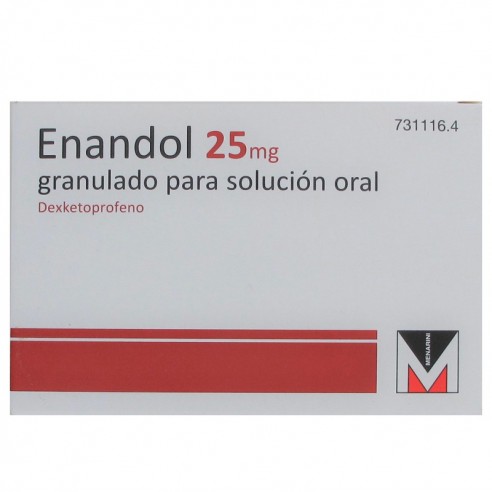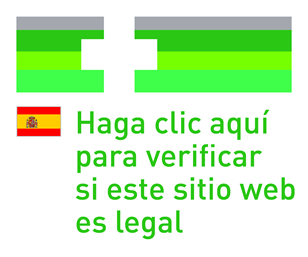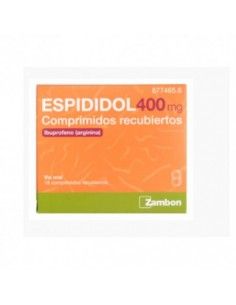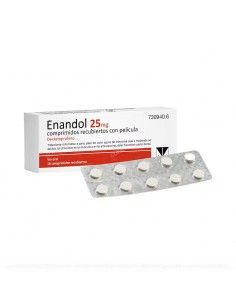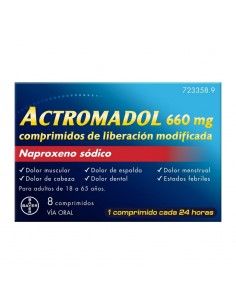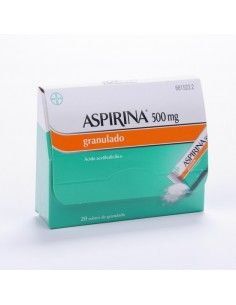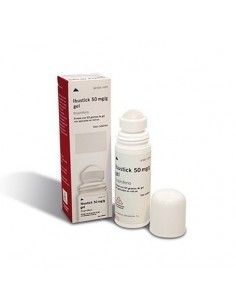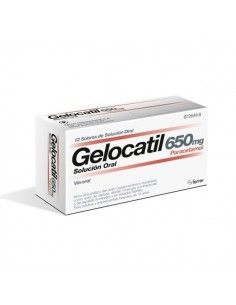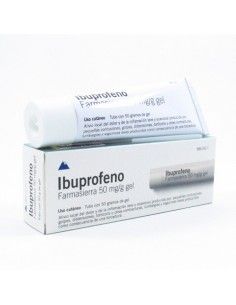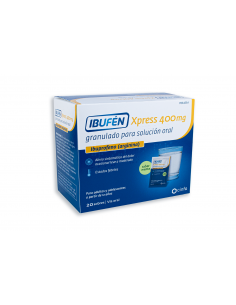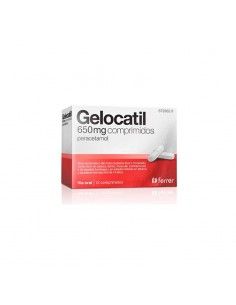Enandol 25 mg 10 Envelopes Granules for Oral Solution
What Enandol is and what it is used forThis medicine is an analgesic belonging to the group of medicines called non-steroidal anti-inflammatory drugs (NSAIDs).
Enandol is used in adults for the short-term symptomatic treatment of acute pain of mild to moderate severity, such as muscle or joint pain (e.g. back pain, sprains and acute trauma), menstrual pain and dental pain.
2. What you need to know before you start taking EnandolDo nottake Enandol
- If you are allergic to dexketoprofen or any of the other ingredients of this medicine (listed in section 6);
- If you are allergic to acetylsalicylic acid or to another non-steroidal anti-inflammatory drug;
- If you have asthma or have had asthma attacks, acute allergic rhinitis (a short period of swelling of the lining of the nose), nasal polyps (fleshy formations inside the nose due to allergy), urticaria (skin rash), angioedema (swelling of the face, eyes, lips or tongue, or difficulty in breathing) or wheezing in the chest after taking aspirin or other non-steroidal anti-inflammatory medicines;
- If you have had photoallergic or phototoxic reactions (special form of redness or burning of skin exposed to sunlight) while taking ketoprofen (a non-steroidal anti-inflammatory drug) or fibrates (medicines used to reduce blood fat levels);
-
If you have peptic ulcer, stomach or intestinal bleeding if you have had bleeding, ulceration or perforation of the stomach or intestine in the past;
-
if you have chronic digestive problems (e.g. indigestion, heartburn);
-
If you have had stomach or intestinal bleeding or perforation in the past, due to previous use of non-steroidal anti-inflammatory drugs (NSAIDs) used for pain;
- If you have chronic inflammatory bowel disease (Crohn's disease or ulcerative colitis);
- If you have severe heart failure, moderate to severe kidney failure or severe liver failure;
- If you have bleeding disorders or blood clotting disorders;
- If you are severely dehydrated (have lost a lot of body fluid) due to vomiting, diarrhoea or insufficient fluid intake;
- If you are in the third trimester of pregnancy or breast-feeding;
Warnings and precautions
Consult your doctor or pharmacist before you start taking Enandol:
- If you are allergic or have had allergy problems in the past;
- If you have kidney, liver or heart disease (hypertension and/or heart failure), or fluid retention or have suffered from any of these conditions in the past;
- If you are taking diuretics or have insufficient hydration and reduced blood volume due to excessive fluid loss (e.g. from excessive urination, diarrhoea or vomiting);
- If you have heart problems, a history of stroke, or think you may be at risk for these conditions (for example, you have high blood pressure, have diabetes, have high cholesterol, or are a smoker) you should discuss this treatment with your doctor or pharmacist. Medicines such as Enandol may be associated with a small increased risk of heart attacks (‘myocardial infarctions’) or strokes (‘cerebrovascular accident’). Any risk is more likely to occur when high doses and prolonged treatments are used. Do not exceed the recommended dose and duration of treatment;
- If you are an elderly patient, you may experience a higher incidence of side effects (see section 4). If these occur, consult your doctor immediately;
- If you are a woman with fertility problems (see section 2, ‘Pregnancy, lactation and fertility’);
- If you have a disorder in the production of blood and blood cells;
- if you have systemic lupus erythematosus or mixed connective tissue disease (diseases of the immune system that affect connective tissue);
- If you have or have had in the past chronic inflammatory bowel disease (ulcerative colitis, Crohn's disease);
- If you suffer or have suffered in the past from stomach or intestinal disorders;
- If you have an infection; see the heading ‘Infections’ below;
- If you are taking other medicines that increase the risk of peptic ulcer or bleeding, e.g. oral corticosteroids, some antidepressants (SSRIs, Selective Serotonin Reuptake Inhibitors), agents that prevent blood clots such as aspirin, or blood thinners such as warfarin or acenocoumarol (Sintrom). In these cases, consult your doctor before taking this medicine: your doctor may prescribe an additional medicine to protect your stomach (e.g. misoprostol or other medicines that block the production of stomach acid).
- If you suffer from asthma, combined with chronic rhinitis or sinusitis, and/or nasal polyps as you have a higher risk of allergy to aspirin and/or NSAIDs than the rest of the population. Administration of this medicine may cause asthma attacks or bronchospasm, particularly in patients allergic to acetylsalicylic acid or NSAIDs.
Infections
Enandol may hide signs of infection, such as fever and pain. Therefore, it is possible that this medicine may delay adequate treatment of the infection, which may increase the risk of complications. This has been seen in pneumonia caused by bacteria and in bacterial skin infections related to chickenpox. If you take this medicine while you have an infection and symptoms of infection persist or worsen, consult a doctor without delay.
Avoid using this medicine if you have chickenpox.
Children and adolescents
This medicine has not been studied in children and adolescents. Therefore, safety and effectiveness have not been established and it should not be used in children and adolescents.
Use of Enandol with other medicines
Tell your doctor or pharmacist if you are taking or have recently taken or may need to take any other medicines, including medicines obtained without a prescription. There are some medicines that should not be taken together and other medicines that may need a change of dose if taken together.
Always tell your doctor, dentist or pharmacist if you are taking any of the following medicines in addition to this medicine:
Not recommended combinations:
- Acetylsalicylic acid, corticosteroids and other anti-inflammatory drugs;
- Warfarin or acenocoumarol (Sintrom), heparin or other medicines used to prevent blood clots;
- Lithium, used to treat some mood disorders;
- Methotrexate (cancer drug and immunosuppressant), used at high doses of 15mg/week;
- Hydantoins and phenytoin, used for epilepsy;
- Sulfamethoxazole, used for bacterial infections;
Associations requiring caution:
- ACE inhibitors, diuretics and angiotensin II antagonists, used for the control of high blood pressure and cardiac disorders;
- Pentoxifylline and oxpentifylline, used to treat chronic venous ulcers;
- Zidovudine, used to treat viral infections;
- Aminoglycoside antibiotics, used for the treatment of bacterial infections; Sulfonylureas (pentoxifylline), used to treat chronic venous ulcers
- Sulphonylureas (e.g. chlorpropamide and glibenclamide), used for diabetes;
- Methotrexate, used at low doses, less than 15mg/week.
Associations to consider:
- Quinolones (e.g. ciprofloxacin, levofloxacin) used for bacterial infections;
- Cyclosporine or tacrolimus, used to treat diseases of the immune system and in organ transplantation;
- Streptokinase and other thrombolytic and fibrinolytic drugs, i.e. drugs used to break up clots;
- Probenecid, used for gout;
- Digoxin, used in the treatment of chronic heart failure;
- Mifepristone, used as an abortifacient (for termination of pregnancy);
- Antidepressants of the Selective Serotonin Reuptake Inhibitors (SSRIs) type;
- Antiplatelet agents used to reduce platelet aggregation and clot formation;
- Beta-blockers, used for high blood pressure and heart disorders;
-
Tenofovir, deferasirox, pemetrexed.
If you have any questions about taking other medicines with Enandol, ask your doctor or pharmacist.
Taking Enandol with food, drinks and alcohol
In general, it is recommended to take the medicinal product with meals to reduce the possibility of stomach upset (see also section 3, ‘Method of administration’).
The use of NSAIDs in combination with alcohol may worsen adverse reactions caused by the active substance.
Pregnancy, lactation and fertility
Do not take this medicine during the last three months of pregnancy or while breast-feeding.
If you are pregnant, think you may be pregnant, or intend to become pregnant, consult your doctor or pharmacist before using this medicine, as it may not be suitable for you.
Women who are planning a pregnancy or are pregnant should avoid using this medicine. Treatment at any time during pregnancy should only take place on the advice of a doctor.
The use of this medicine may impair fertility, so its use is not recommended while trying to conceive or while an infertility problem is being studied.
Driving and using machines
This medicine may slightly affect your ability to drive and use machines, as it may cause drowsiness, dizziness and blurred vision as side effects of treatment. If you notice these effects, do not use machines or drive until these symptoms disappear. Ask your doctor for advice.
Enandol contains sucrose; if you have been told by your doctor that you have an intolerance to certain sugars, consult your doctor before taking this medicine.
3. How to take EnandolFollow exactly the instructions for taking the medicine given in this leaflet or as directed by your doctor or pharmacist. If you are in any doubt, ask your doctor or pharmacist.
The required dose of the medicine may vary depending on the type, severity and duration of pain.
The lowest effective dose should be used for the shortest time necessary to relieve symptoms. If you have an infection, consult a doctor without delay if symptoms (such as fever and pain) persist or worsen (see section 2).
Adults over 18 years of age
In general, the recommended dose is 1 sachet (25 mg dexketoprofen) every 8 hours, not exceeding 3 sachets per day (75 mg).
Elderly patients or patients with renal or hepatic impairment
If you are an elderly patient, or if you have mild kidney problems or mild to moderate liver problems, it is recommended to start treatment with a maximum of 2 sachets per day (50 mg dexketoprofen).
In elderly patients this initial dose may be subsequently increased according to the general recommended dose (75 mg dexketoprofen) if dexketoprofen has been well tolerated.
You should not use dexketoprofen if you have moderate or severe kidney problems or severe liver problems. Consult your doctor or pharmacist if you are unsure.
Use in children and adolescents
This medicine should not be used in children and adolescents (under 18 years of age).
Directions for use
Dissolve the entire contents of one sachet in a glass of water; shake/stir to aid dissolution. The solution obtained should be taken immediately after reconstitution.
The medicine can be taken with or without food. Taking the medicine with food helps to decrease the risk of stomach upset, however if your pain is more severe and you need faster relief, take the sachet on an empty stomach (at least 15 minutes before any meal or food intake) because it will be more easily absorbed (see section 2 ‘Taking Enandol with food, drinks and alcohol’).
Duration of treatment
Treatment should not exceed 4 days. If pain persists after this period of time, worsens or other symptoms appear, you should stop treatment and consult your doctor or pharmacist.
If you take more Enandol than you should
Consult your doctor or pharmacist immediately or call the Servicio de Información Toxicológica, telephone 91.562.04.20, indicating the medicine and the amount taken. It is recommended that you take the pack and the package leaflet with you to your health care professional.
If you forget to take Enandol
Do not take a double dose to make up for a forgotten dose. Take the next dose when appropriate (according to section 3 ‘How to take Enandol’).
If you have any other questions about the use of this medicine, ask your doctor or pharmacist.
4. Possible side effectsLike all medicines, this medicine can cause side effects, although not everybody gets them.
The possible side effects are listed below according to frequency. Because the list is based in part on side effects observed with oral use of tablets, and because the granules for oral solution are absorbed more rapidly than tablets, the actual frequency of side effects (gastrointestinal) may be higher in the granules for oral solution.
Common side effects: may affect up to 1 in 10 persons
Nausea and/or vomiting, mainly upper quadrant abdominal pain, diarrhoea, digestive disorders (dyspepsia).
Rare side effects: may affect up to 1 in 100 people
Rotatory sensation (vertigo), dizziness, drowsiness, sleep disorders, nervousness, headache, palpitations, hot flushes, inflammation of the stomach wall (gastritis), constipation, dry mouth, flatulence, skin rash, fatigue, pain, feverish feeling and chills, malaise.
Rare adverse effects: may affect up to 1 in 1,000 people
peptic ulcer, peptic ulcer perforation or bleeding (which may manifest with vomiting of blood or black stools), fainting, high blood pressure, slowed breathing, fluid retention and peripheral swelling (e.g. swelling of ankles), laryngeal oedema, loss of appetite (anorexia), abnormal sensation, itchy rash, acne, increased sweating, lower back pain, frequent urination, menstrual disturbances, prostate disturbances, abnormal liver function tests (blood tests), liver cell damage (hepatitis), acute renal failure.
Very rare side effects: may affect up to 1 in 10,000 people
Anaphylactic reaction (hypersensitivity reaction which may also lead to collapse), ulcers of the skin, mouth, eyes and genital areas (Stevens Johnson syndrome and Lyell's syndrome), swelling of the face or swelling of the lips and throat (angioedema), difficulty in breathing due to narrowing of the airways (bronchospasm), shortness of breath, tachycardia, low blood pressure, inflammation of the pancreas, blurred vision, ringing in the ears (tinnitus), sensitive skin, sensitivity to light, itching, kidney problems. Decreased number of white blood cells (neutropenia), decreased number of platelets (thrombocytopenia).
Tell your doctor immediately if you notice any gastrointestinal side effects at the start of treatment (e.g. stomach pain, heartburn or bleeding), if you have previously experienced any of these side effects due to prolonged treatment with anti-inflammatory drugs, and especially if you are elderly.
Stop taking this medicine immediately if you notice the appearance of a skin rash or a lesion inside the mouth or on the genitals, or any other signs of allergy.
Fluid retention and swelling (especially in the ankles and legs), increased blood pressure and heart failure have been reported during treatment with non-steroidal anti-inflammatory drugs.
Medicines such as Enandol may be associated with a small increased risk of heart attack (‘myocardial infarction’) or stroke (‘cerebrovascular accident’).
In patients with immune system disorders affecting connective tissue (systemic lupus erythematosus or mixed connective tissue disease), anti-inflammatory drugs may rarely cause fever, headache and stiff neck.
The most commonly observed adverse effects are gastrointestinal. Peptic ulcers, perforation or gastrointestinal bleeding, sometimes fatal, may occur, especially in elderly patients.
Nausea, vomiting, diarrhoea, flatulence, constipation, dyspepsia, abdominal pain, melena, haematemesis, ulcerative stomatitis, worsening of colitis and Crohn's disease have been reported after administration. Less frequently, inflammation of the stomach wall (gastritis) has been observed.
As with other NSAIDs, haematological reactions (purpura, aplastic and haemolytic anaemia, and more rarely agranulocytosis and bone marrow hypoplasia) may occur.
Reporting side effects
If you experience any side effects, please tell your doctor, pharmacist or nurse, even if they are not listed in this leaflet. You can also report them directly to the Spanish Pharmacovigilance System for Medicinal Products for Human Use: www.notificaram.es. By reporting adverse effects you can help to provide more information on the safety of this medicine.
5. Storage of EnandolKeep this medicine out of the sight and reach of children.
Do not use this medicine after the expiry date which is stated on the carton and envelope after EXP. The expiry date is the last day of the month shown.
No special storage conditions are required.
Medicines should not be flushed down the drain or thrown away. Please dispose of containers and medicines that you do not need at the SIGRE Point at the pharmacy. If in doubt, ask your pharmacist how to dispose of unneeded medicine containers and medicines. In this way, you will help to protect the environment.
6. Contents of the pack and additional informationComposition ofEnandol
-
The active substance is dexketoprofen (as dexketoprofen tromethamol). Each sachet contains 25 mg dexketoprofen.
-
The other ingredients are: ammonium glycyrrhizate, neohesperidin dihydrochalcone, quinoline yellow (E-104), lemon flavouring, sucrose (see section 2, Enandol contains sucrose).

